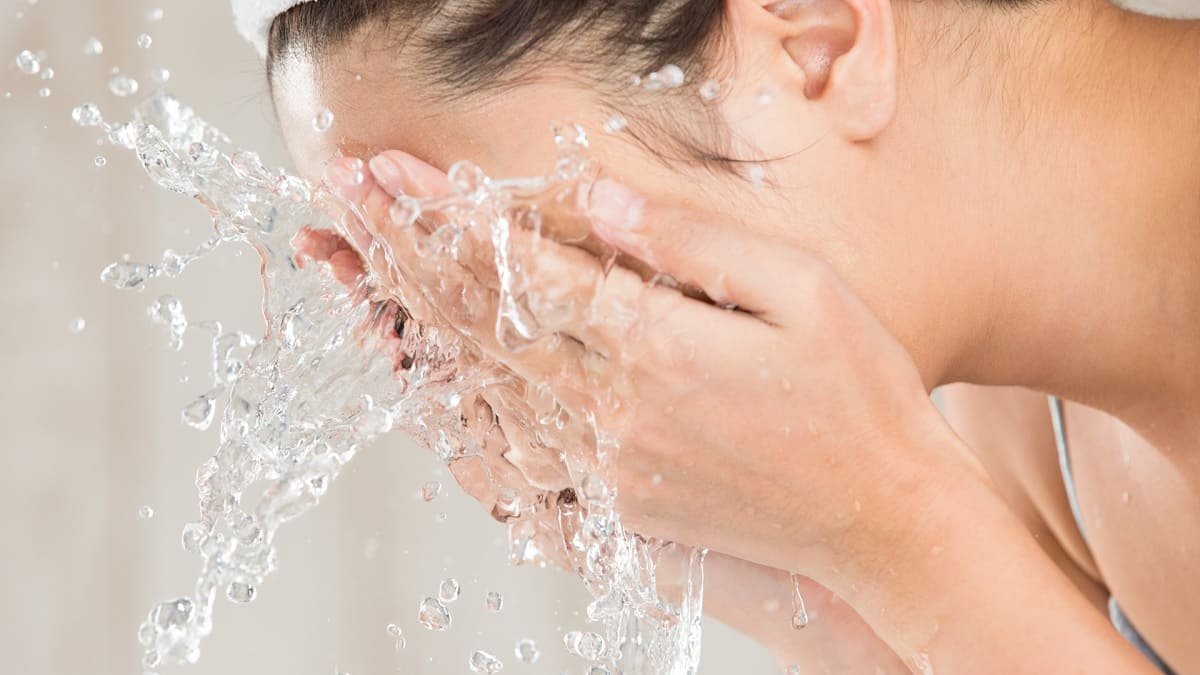10 Best Solutions to Soften Hard Water for Washing Face 2025

Hard water can cause major issues for your skin, especially your face. The high mineral content in hard water leaves residue on your skin, clogging pores and causing irritation, dryness, flaking, and even breakouts. That’s why finding ways to soften hard water is so important for getting the best results from your facial cleansing routine.
The good news is that there are many effective options for tackling hard water, so you can enjoy softer skin. Here are the top 10 best solutions for softening hard water for washing your face in 2023.
10 Best Solutions for Softening Up Hard Water for Washing Your Face
- Use a Water Softening Showerhead
Installing a water-softening showerhead is one of the easiest ways to immediately soften the water from your shower or sink faucet. Water softening showerheads use a filtration system, usually containing ion-exchange resin beads, to remove minerals like calcium and magnesium from the water. This prevents that sticky, rough feeling on your skin from the mineral residue.
Look for a showerhead that specifically mentions softening hard water. Be sure to follow the instructions for installation and filter replacement. Using a water-softening showerhead provides an easy fix for softer water to wash your face whenever you need it.
- Try a Countertop Water Filtration System
Countertop water filters are another hassle-free option for softening hard water in your bathroom or kitchen sink. They connect directly to your faucet and filter out minerals as the water passes through. Countertop systems that use reverse osmosis or deionization processes work best to soften water for washing your face.
Consider a unit with multiple filter stages to remove more minerals and impurities. Look for a compact design that won’t take up too much space. Be diligent about changing the filter as needed to keep it working properly. A countertop filtration system delivers soft water on demand for face washing.
- Use a Water Softening Additive
Adding a water-softening solution to your rinse water is a fast, simple way to soften water for facial cleansing. Look for water-softening drops or powders made specifically for the face. They typically contain ingredients like magnesium or potassium salts that help rinse away any mineral residue.
Just add the recommended amount to your basin of rinse water. Some additives are gentle enough to leave on your skin. But be sure to thoroughly rinse your face after using any water-softening additives to prevent residue. Using a softening additive lets you quickly adjust the water for your skin’s needs.
- Wash Your Face with Bottled Water
Washing your face with bottled water is one sure way to avoid the effects of hard water minerals. Bottled waters labeled as distilled, purified, or deionized offer soft water free of any minerals. Some bottled spring waters are also naturally soft. Check the label for hardness measurements.
Keep some bottled facial cleansing water handy for washing your face anytime your skin needs a break from hard water. Though buying bottled water can get expensive, it’s inexpensive for the small amounts needed to wash your face. It provides pure, soft water for your skin when you need it.
- Consider Installing a Whole House Water Softener
For the most complete solution to soften water throughout your home, consider installing a whole-house water softening system. This unit connects to your main water supply line. As water enters your home, minerals like calcium and magnesium are removed through an ion exchange process.
Though whole-house systems require a bigger investment upfront, they provide softened water from every faucet and shower in your home. This ensures softened water not just for washing your face, but also for hair, bathing, laundry, dishes, and more. It’s the most comprehensive solution for protecting your skin and hair from hard water damage.
- Use a Face Cleansing Brush with Softened Water
Washing your face with a facial cleansing brush helps soften and smooth skin by removing dirt, oil, and dead skin cells. But for the best results, be sure to wet and rinse the cleansing brush with softened water. This prevents any mineral residue from the water from being transferred onto your skin.
Choose a brush with soft, gentle bristles. Use light pressure and small circular motions. Rinse thoroughly after each use. Combining a facial brush with softened water gives a deeper clean without irritation from hard water minerals. Your skin feels super soft and supple.
- Try a Soft Water Cleanser Formula
Look for facial cleansers specially formulated for use with hard, softened, or neutral water. Labels may specify “hard water-friendly” or “deionized water-compatible.” These cleansers use surfactants and ingredients that won’t react with minerals to leave residue on your skin.
Using a compatible face wash prevents lathering issues in hard water, so the cleanser can still rinse cleanly. A soft water cleanser helps enhance your other efforts to soften the water for a residue-free wash. Your skin stays refreshed and residue-free.
- Install a Water Softening Shower Filter
Shower filters are another option for softening up the water right where you need it. Water-softening shower filters attach easily to existing plumbing. As you shower, they remove up to 90% of minerals from the water for a softer feel.
Using a filtered shower head also protects your skin and hair from potential damage caused by chlorine. Look for a unit with multiple filter stages to remove more impurities. Be sure to replace cartridges as directed to maintain effectiveness. Softened shower water leaves your skin feeling cleaner and less irritated.
- Use Micellar Water for Cleansing
Micellar water is soft water that contains tiny micelles or oil molecules suspended in water. These micelles gently cleanse the skin and dissolve oil and makeup without harsh detergents. Micellar water is naturally soft. Most brands don’t contain minerals or hard water deposits.
Use cotton pads soaked in micellar water to gently remove dirt, oil, and impurities without rubbing your skin. It’s great for sensitive skin prone to hard water irritation. Micellar water offers a mild, soft water cleansing option perfect for your face-washing routine.
- Try Cleansing Oils and Balms
Cleansing oils and balms rinse away completely with just water, so you avoid any issues with hard water mineral residue. These oil-based cleansers dissolve makeup, sunscreen, and impurities without drying out your skin. They lift away dirt and debris without harsh scrubbing.
Massage the cleansing oil or balm onto dry skin, then emulsify with a little water. Rinse thoroughly and pat dry. The key is using soft water to rinse. These cleansers are extremely effective yet gentle on the skin. Your face stays clean, soft, and hydrated.
FAQs About Softening Hard Water for Face Washing
Q: Is hard water bad for your face?
Yes, washing your face with hard water can be bad for your skin. Hard minerals like calcium and magnesium bind to dirt and oil on your skin. This forms a residue that clogs pores and causes acne, dryness, and irritation. Softened water allows thorough cleansing without leaving any residue.
Q: What homemade mixtures soften hard water?
Some effective homemade options for softening small amounts of water for face washing include:
- 1 teaspoon citric acid powder per 1 cup of water
- 1 teaspoon of borax per 1 gallon of water
- 1 teaspoon washing soda per 1 gallon of water
Stir to dissolve before using to rinse your face. Check water hardness after treatment to ensure sufficient softening.
Q: Can I boil hard water to soften it?
Boiling water doesn’t remove hardness minerals, so it doesn’t truly soften the water. Boiling may increase mineral concentration as some water evaporates away. The remaining water could have an even higher mineral content and require additional treatment to soften it for washing your face.
Q: Is distilled water good for washing your face?
Yes, distilled water is one of the best choices for gently cleansing your face. The distillation process removes all minerals from the water, leaving pure soft water perfect for your face. Distilled water won’t leave any residue and won’t aggravate sensitive skin. It’s a great facial wash water option.
Q: Is filtered water soft enough to wash your face?
It depends on the type of filtration system. Carbon filtration, like in water pitchers and faucet filters, removes chlorine and contaminants but doesn’t soften hardness minerals. Reverse osmosis and deionization filtration produce water soft enough for face washing by reducing the mineral content. Check your system specs to be sure.
Conclusion
Washing your face with hard water can negatively impact your complexion. Mineral deposits leave skin feeling sticky and looking dull. They can clog pores and cause acne breakouts. The key is softening your water to remove the hardness minerals.
Installing water-softening showerheads or filters provides an easy solution. Water softening additives can adjust water hardness quickly. Micellar water, cleansing oils, and distilled water also allow residue-free cleansing. Find the best hard water softening option to give your face gentle, thorough cleansing for clear and glowing skin.



